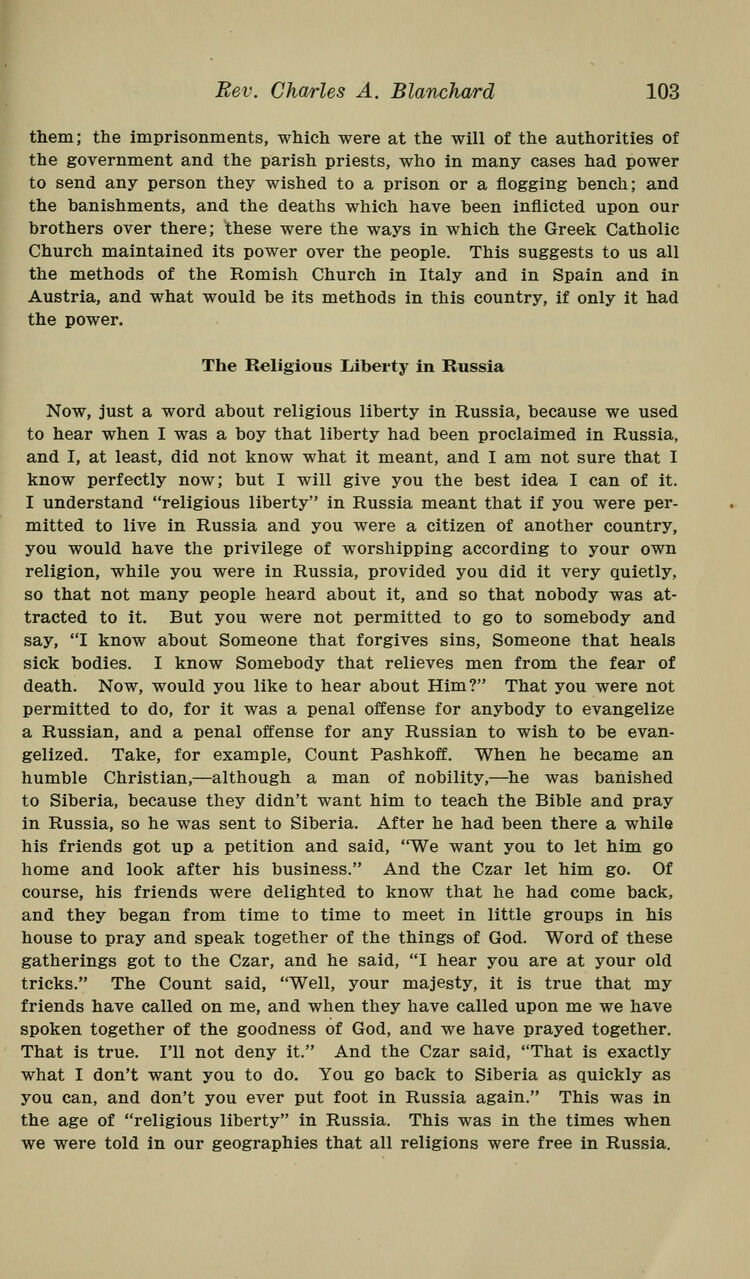
Full resolution (JPEG) - On this page / på denna sida - What Has Been Done to Evangelize Russia? The Rev. Chas. A. Blanchard, D. D. - 300 Years Under Romanoffs - The Religious Liberty in Russia

<< prev. page << föreg. sida << >> nästa sida >> next page >>
Below is the raw OCR text
from the above scanned image.
Do you see an error? Proofread the page now!
Här nedan syns maskintolkade texten från faksimilbilden ovan.
Ser du något fel? Korrekturläs sidan nu!
This page has never been proofread. / Denna sida har aldrig korrekturlästs.
Eev. Charles A. Blanchard 103
them; the imprisonments, which were at the will of the authorities of
the government and the parish priests, who in many cases had power
to send any person they wished to a prison or a flogging bench; and
the banishments, and the deaths which have been inflicted upon our
brothers over there; these were the ways in which the Greek Catholic
Church maintained its power over the people. This suggests to us all
the methods of the Romish Church in Italy and in Spain and in
Austria, and what would be its methods in this country, if only it had
the power.
The Religious Liberty in Russia
Now, just a word about religious liberty in Russia, because we used
to hear when I was a boy that liberty had been proclaimed in Russia,
and I, at least, did not know what it meant, and I am not sure that I
know perfectly now; but I will give you the best idea I can of it.
I understand "religious liberty" in Russia meant that if you were per-
mitted to live in Russia and you were a citizen of another country,
you would have the privilege of worshipping according to your own
religion, while you were in Russia, provided you did it very quietly,
so that not many people heard about it, and so that nobody was at-
tracted to it. But you were not permitted to go to somebody and
say, "I know about Someone that forgives sins. Someone that heals
sick bodies. I know Somebody that relieves men from the fear of
death. Now, would you like to hear about Him?" That you were not
permitted to do, for it was a penal offense for anybody to evangelize
a Russian, and a penal offense for any Russian to wish to be evan-
gelized. Take, for example, Count Pashkoff. When he became an
humble Christian,—although a man of nobility,—^he was banished
to Siberia, because they didn’t want him to teach the Bible and pray
in Russia, so he was sent to Siberia. After he had been there a while
his friends got up a petition and said, "We want you to let him go
home and look after his business." And the Czar let him go. Of
course, his friends were delighted to know that he had come back,
and they began from time to time to meet in little groups in his
house to pray and speak together of the things of God. Word of these
gatherings got to the Czar, and he said, "I hear you are at your old
tricks." The Count said, "Well, your majesty, it is true that my
friends have called on me, and when they have called upon me we have
spoken together of the goodness of God, and we have prayed together.
That is true. I’ll not deny it." And the Czar said, "That is exactly
what I don’t want you to do. You go back to Siberia as quickly as
you can, and don’t you ever put foot in Russia again." This was in
the age of "religious liberty" in Russia. This was in the times when
we were told in our geographies that all religions were free in Russia.
<< prev. page << föreg. sida << >> nästa sida >> next page >>